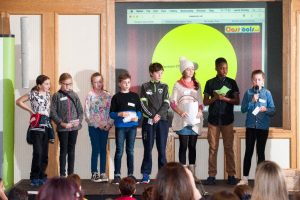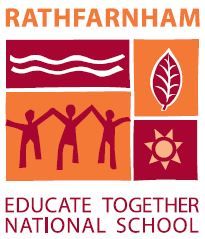We view children as experts on their own lives. They are our key informants and best source of advice on matters affecting their lives. (MacNaughton et al, 2003).
The ‘Pupil Voice’ is a term that is becoming more frequently used in educational terms today. Long gone are the days when children were to be “seen and not heard”. Today it is widely recognised that children and young people have a voice and that this voice has to be listened to in matters that concern them. In its statement of values and commitments, Educate Together reiterates its commitment to:
- Placing the child at the centre of the educational process
- Empowering children to take an active role in society and in the stewardship of the environment
- Working in a democratic way that embraces the input from children, parents, teachers and supporters to enable the highest level of partnership and participation
In all of these commitments there is an onus on Educate Together schools to actively seek the participation of children in their own learning and to ensure that they have a voice, that they are listened to, that their opinions are actively sought and that they are allowed to give expression to their thoughts and ideas in a supportive, encouraging environment.
This year Educate Together is running a new online summer course for teachers entitled Facilitating Pupil Voices and Active Citizenship:
This course addresses a topical and exciting area in primary education. Pupils aren’t ‘citizens in waiting’. They are citizens right now with perspectives and opinions about the world around them. This course looks at strategies to affirm pupil voices and encourage engagement with issues of particular concern. It aims to nurture a validation of pupil identities whilst also encouraging a sense of empowerment and social responsibility.
In Rathfarnham Educate Together, in all of our classes, you will see, at various times, children planning together, investigating, sharing thoughts and ideas with their teachers and peers, making decisions about their learning. Very often they themselves are the best sources of information on their own learning and the best place to go for advice on how to make improvements. In our recent survey carried out on behalf of the school development committee a lot of very interesting insights and ideas were provided by the children which will inform our school development process. John Mac Beath, an international educationalist and renowned speaker in educational circles, believes very strongly that change in schools needs to start with the children. He talks of a process of “bottom up development with top down support”. Children are the future and their views are important, therefore we should explicitly invite children’s views all the time.
Young children are wiser than many might think; under the appropriate circumstances they have the capacity to express their views powerfully and often simply.
(Christensen & James, 2000; MacNaughton et al, 2003; Moloney, 2005)
From its inception Rathfarnham Educate Together was committed to listening to pupils’ voices and giving them an active role in the school. The first student council was formed in November 2003 when this was a very new idea in primary schools, and this is one aspect of our school life that has survived and grown in strength year on year. We have added more committees over the years and we now have many different areas of school life where pupils’ voices are actively sought and their views listened to at committee level. The student council is always decided by a peer vote, after students have been given an opportunity to present their ‘manifesto’ and make a speech. Many students make posters and actively canvass support, others put great effort into their speeches. The student council vote is also an opportunity to experience the democratic process in action, where there have to be winners and losers. During their year the members of the student council perform various tasks which sometimes involves liaising with outside agencies, and they have had meetings with the Chairperson of the Board of Management, giving them a sense of the overall issues involved in running a school. Recently our student council has teamed up with the student council from Firhouse ETNS for school visits and sharing of ideas, and these inter-school pupil interactions will continue with other ET schools in the future.
Some of the other committees require different skills such as making an application, which involves being able to highlight their own skills and attributes that would make them successful in a particular role. The role of the Green School Committee in our school ties in very closely with the ET commitment to allowing children to take an active role in society and in the stewardship of our environment and is a committee which those who have a natural aptitude in this area strive to join. The ICT Committee is comprised of a group of students who are talented in the use of ICT and who wanted to put these talents and skills to use for the good of the school. They strive to raise the online profile of the students in RETNS through the Kids’ Blog on our website, as well as organising internal, ICT based competitions. This year they held a very successful Games Day to fund-raise for more tablets for the school. The Anti-Bullying Ambassadors are fully committed to taking on the commitment of ensuring that we have a happy school where bullying is not allowed to take root. They put forward a number of ideas each year to promote good relationships among students and they actively work on the playground to ensure that children are playing happily and that no-one is excluded. One of the most important roles of the anti-bullying ambassadors team has been to develop bonds between senior and junior students and over the years this has resulted in greater whole school harmony and a real sense of caring in the school. This year a student Sports Committee got under way, and this will be developed further as the school seeks ‘active school’ recognition in the coming year.
We are very proud of all the students who put themselves forward on the various committees and their work is invaluable to the smooth running of the school. Thanks to all who worked so hard on each of the committees this year and also to the staff members who give up lunch breaks and free time to work with the students and support their various ideas.
There are also those who don’t go down the official committee route but who use their voice for change through debating, writing to relevant bodies on matters of concern, speaking their views in class, developing their passions and using their insights to inform opinion on various areas of the curriculum. In an introduction to the summer course Educate Together states:
The current cohort of primary school children will be dealing with a very different world when they reach adulthood due to climate change, scarcity of resources and loss of habitat.
They’ll need to have the confidence and resilience to address issues. They’ll need to be able to discuss and debate, to identify problems, to seek solutions. And they’ll need to be able to lobby for change.
This year during our Global Citizenship work many children really embraced the idea of become active citizens and during Plastic Free February in particular we had a number of very valuable contributions from students in terms of agitating for change in the wider community.
Children need to know that their views are important, they need to be given an outlet for the expression of these views and they need to know that there is a genuine interest in their views and opinions. Throughout the school year, on so many of our whole school projects, staff have aimed to establish a ‘shared understanding’ with the pupils, a genuine listening and supporting of ideas, and have given real hands-on experiences in which pupils could explore and express those ideas.
Children have much to say which is of relevance in today’s world and they say in in a myriad of ways; through talk, writing, poetry, drama, visual arts, dance, movement and music. It is incumbent on all adults to listen to the pupils’ voice and support their desire and efforts to make the world a better place for their future.

Rathfarnham ETNS Student Council pictured at the Educate Together Ethical Education Conference in Dublin, November 25 and 26 2016.
Our student council was represented at the ET Ethical Conference in 2016, where the theme of Raising Student Voices affirmed the right of students to be active participants in their own education.

Recent Comments